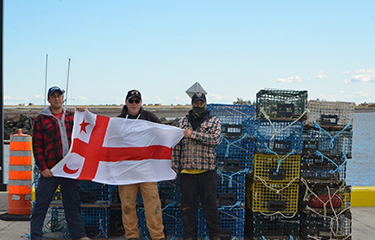Tensions have mounted in Nova Scotia, Canada, as the Sipekne'katik First Nation started a fall season for lobster outside of the standard federally regulated season.
A Supreme Court decision 20 years ago, known as the Marshall Decision, declared that the tribes of the Mi’kmaw have a constitutional right, protected by treaty, to fish in pursuit of a moderate livelihood. That decision is what has resulted in a fall fishery for lobster by the Sipekne'katik, who use landings as a food source and this year plan to sell catch within neighboring communities.
According to a CBC, the fishery began after the tribe couldn’t come to an agreement with the Department of Fisheries and Oceans (DFO) on what the definition of a “moderate” livelihood would mean for the fishermen.
Commercial fishermen not affiliated with the indigeneous group have objected to the practice, stating that the fishing equipment being used in the fishery is illegal. Fishermen emphasized the opposition as a flotilla of boats cut ropes on trap lines and dumped a load of 100 “illegal traps” outside the Department of Fisheries and Oceans office in the region. In addition, fishermen gathered in large numbers outside the home of someone who supposedly purchased Mi’kmaw-harvested lobster.
In addition to hauling traps, the Royal Canadian Mounted Police arrested two people on assault charges after confrontations flared, and indigenous fishermen followed by setting up a blockade outside wharves the tribe uses, CTV News reported.
A press release by Sipekne'katik Chief Michael Sack said the situation is “David and Goliath.”
“We have seven boats, each with a potential of 50 traps, which we are monitoring and will be recording and reporting on," Sack said in a press release. He also called for charges against the individuals who cut the lines on Sipekne'katik traps.
Earlier in September, a coalition of regional fishery organizations issued a list of demands to the DFO, which includes “immediate action on the water” to stop “all out of season commercial fishing.”
Mi’kmaw leaders have continued to assert that they have a constitutional right to fish in the area. In a joint statement issued 21 September, Canadian Fisheries Minister Bernadette Jordan and Indigenous Relations Minister Carolyn Bennett backed the Mi'kmaw's rights to sell the lobster they catch this fall.
“We thank the Assembly of Nova Scotia Mi'kmaw Chiefs for their leadership and for the open, respectful, and constructive conversation today, where we affirmed what the Marshall Decision declared over 20 years ago – that Mi'kmaw have a constitutionally protected treaty right to fish in pursuit of a moderate livelihood,” the minsters stated. “We share the concerns of the Assembly Chiefs for the safety of their people. There is no place for the threats, intimidation, or vandalism that we have witnessed in Southwest Nova Scotia. This is unacceptable.”
Fishing organizations continue to assert the opposition has nothing to do with the First Nation’s right to fish, and more to do with illegal fishing activity.
"This is about conserving the fishery for everyone – both indigenous and non-indigenous fishermen. Unless there is one set of rules driven by conservation of the fishery, Canada's fishery will be destroyed," Coldwater Lobster Association President Bernie Berry said in a press release. "According to the Department of Fisheries and Oceans own data, the commercial landings in St. Mary's dropped from 1,720 to 650 metric tons since 2017. That is nearly a 65 percent drop in commercial landings for lobster in three years. This is directly related to the massive increase in the illegal out of season fishery during that time."
Efforts to further bar First Nation fishermen by commercial fishermen may run into trouble as the minister’s statement makes it clear that federal organizations will be coordinating efforts to protect the Mi’kmaw’s fishing rights.
“DFO fishery officers, Canadian Coast Guard vessels and personnel, Royal Canadian Mounted Police, and public safety officials are coordinating their efforts in the sea, on the land, and in the air, and are working with officials from the Province of Nova Scotia to respond to any dangerous situations as they may arise,” the statement said. “Reconciliation is a Canadian imperative and we all have a role to play in it. What is occurring does not advance this goal, nor does it support the implementation of First Nation Treaty rights, or a productive and orderly fishery.”
Photo courtesy of Listuguj Mi'gmaq Government







